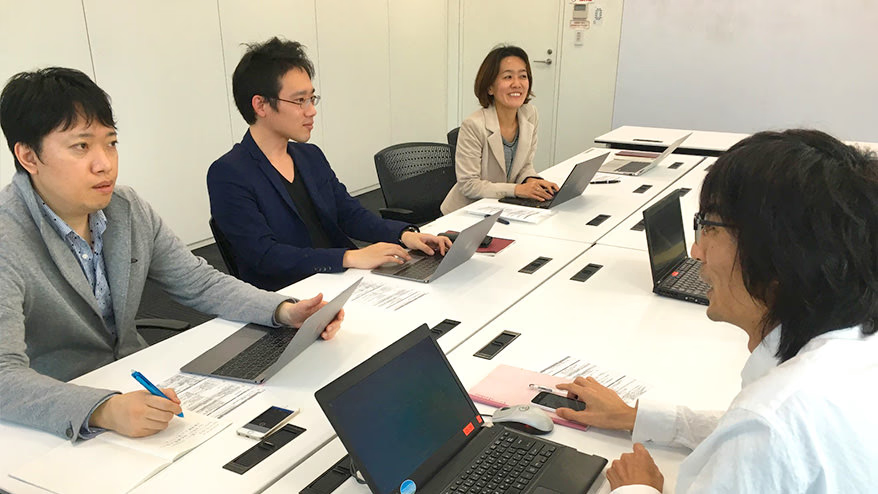こんにちは、ディレクターの中川隼人です。
最近は年度末の繁忙期ということもあり、ディレクションよりコーディング業務の方が多くなっています。
ただ、コーディングばかりしているとディレクションのことを忘れてしまいそうになるので、備忘録としての意味も含め、自分が最も苦手だった議事録についてお話しさせて頂ければと思います。
議事録との出会い
「はやと、議事録書ける?」
ディレクター見習いとして打ち合わせに同行していたころ、上司からそう言われたときは「議事録…って何ですか??」としか答えられませんでした。
話を聞いてみると、どうやら会議で自分たちやお客様が話したことを文章化すればいいとのこと。
それなら何とかなるだろう、と軽く考え「わかりました。とりあえず書いてみます。」と答えたところからが、議事録との戦いの始まりでした…。
議事録が書けない…
「◯◯(上司)さん、議事録を作成しましたので、ご確認をお願いします。」
「◯◯(上司)さん、議事録を修正しましたので、ご確認をお願いします。」
「◯◯(上司)さん、議事録を再度修正しましたので、ご確認をお願いします。」
いったい何度このやりとりを繰り返しただろうか…。
何度書いてもOKにならないどころか、赤字の指摘は書く回数を重ねるごとに多くなっている気がしました。
正直、書いていくうちに慣れて何とかなるだろうと思っていたら、全くもってそんなことはありませんでした。
もともと、国語力や語彙力には自信がなかったのに、なぜどうにかなると考えてしまったのか…。
一度、最終的に上司が修正して提出した議事録を見てみたものの、自分の書いたものとの差が分かりません。
そこで、「差が分からないのなら、機械的に比較しよう」と考え、差分比較ツールで書いた内容を比較することにしてみました。

Kaleidoscopeを使用しての議事録の比較
すると、書いてある大筋は変わらないものの、主語などの細かい箇所が書き足されており、議事録は細かく書かなければ議事録としての意味を成さないことに気付きました。
例えば、
「第4階層はA案で進める。」
という文では、PCのことなのか、スマホのことなのか分からず、A案の内容も不明瞭です。ですので、
「PCの第4階層はA案(サイドメニューあり)のデザインで進める。」
というように、足りない部分を補うことでようやく人に伝わるものになりました。
このように、自分の知識だけでは不十分な場合は、最初はツールなどを使って機械的にチェックすることで、議事録に何を書く必要があるのかが分かるようになりました。
決まったこと(決定事項)と
タスク(継続課題)に分ける
また、議事録を記録する際に「何がどのような形で決まり、決まっていないことは誰がいつまでに決める必要があるのか」をはっきりさせておかないと、スケジュール通りに進めることが難しいことにも気付きました。
「グローバルナビゲーションの色については提案した内容で決定とするが、グローバルナビゲーションのテキストについては◯◯様にてご検討頂き、変更がある場合はご連絡頂く【◯◯様 4/2迄】」
最初はスケジュールさえきちんと作っていれば何とかなるだろうと考えていました。
ただ、それだけでは不十分で、スケジュールに載らないような細かいタスクを議事録に記載し全員のタスクを共有することで、結果的にスケジュール通りに進むのだと気付くことができました。
『毎日の準備が実のあるミーティングにつながる』の「議題が課題になる」の章にも書かれてありますが、お客様との会議自体を「決定事項と継続課題」になるように準備し、進めていく必要がある司会進行の仕方についても議事録を書いていくうちに学ぶことができました。
議事録を通して
上司や先輩ディレクターに質問をしたことがあります。
「ディレクターにとって、最も重要なスキルは何なのか?」
その結果、返ってきた答えが「議事録をきちんと書けるようになること」でした。
議事録を書けるということは、スケジュールに対して何をいつまでに終わらせる必要があるかという「進捗管理能力」であり、それこそがディレクターにとって最も大切なスキルである、と。
ディレクションには様々な業務があり、どれも大切ですがその中でも「議事録を書ける(ようなディレクションを行う必要がある)」ということが、プロジェクトを進めていく上で必要不可欠であると学ぶことができたのは、自分の中で大きな発見でした。
とはいえ、私のディレクターとしての期間はまだまだ短い方で、学ばなければならないことは多くありますが、今後も議事録を取り続け「お客様や社内を問わず全員が安心してゴールを目指せる」ような議事録を書いていけるように精進していきたいと思っています。

